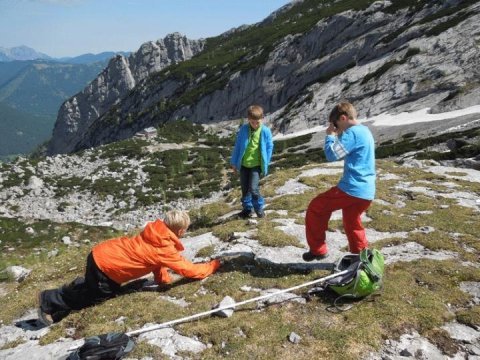Outdoor lessons make students more open to learning

Being taught science subjects outdoors increases student motivation. A study therefore suggests offering more outdoor instruction at the lower secondary level.
"There is still a conceptual gap between teaching science and environmental education,"
says Dr. Ulrich Dettweiler, Associate Professor of Education at the University of Stavanger in Norway, formerly employed at TUM. To close this gap and to get pupils excited about the natural sciences is a goal of the "researcher weeks" at the Berchtesgadener Land student research center.
Between 2014 and 2016, approximately 300 students participated in the program which is based on the curriculum for science subjects in secondary level I. Students are prepared for the one-week stay in the classroom. This is then continued on site during the research week, culminating in a two-day research expedition with experiments.
Both before and after the course, the students completed a questionnaire on their satisfaction and overall motivation in relation to their autonomy for a study developed at TUM. At the end of the week, the students again shared their experiences during the outdoor class.
Basic psychological needs are better met during outdoor instruction
In the pedagogical context, the basic psychological needs to experience autonomy and competence as well as positive social relationships exert the primary influences on motivational behavior. The study showed that motivational behavior in both contexts was influenced equally strongly by these three needs, albeit at different levels: Basic needs are met to a significantly higher degree during outdoor instruction than in the classroom. A sense of achievement particularly increases motivation during outdoor instruction. On the other hand, the student-teacher or student-student relationships had little or no influence on this increase. Nor did gender have any influence on the results.
Lead author Dettweiler from the study published in Frontiers in Psychology concludes that outdoor instruction with explorative learning methodology significantly promotes the attitudes of students toward learning, i.e. their intrinsic motivation. 'Explorative' means nothing more than simply giving students the freedom to discover the subject matter through independently organized experiments. These outdoor dynamics, which provide a strong boost to more situational interest for science and engagement with the subject, can be evoked in occasional outdoor instruction sessions as well.
The teaching techniques explored and developed for this instructional program should therefore be included as a standard feature of lessons in schools. "Whether it involves rural study centers away from school or forms a part of the science curriculum, or both, this statistical analysis demonstrates that regular outdoor teaching is an appropriate strategy to meet the challenges of the 21st century," Dettweiler concludes. "Such models might even be suitable to bridge the existing gap between science education and environmental education in the long term."
For Professor Perikles Simon, Head of the Department of Sports Medicine, Rehabilitation, and Prevention at the Johannes Gutenberg University in Mainz, the outdoor learning units developed are also interesting from the perspective of potentially positive effects on the physical and mental health of children: "In the coming years, we would like to conduct more specific research into whether and how outdoor instruction influences children's resilience to stress."
Materials provided by Technical University of Munich (TUM).